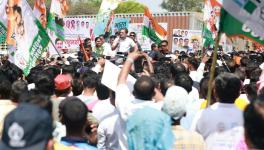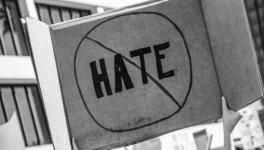Erdogan Consolidates Hold on Power

Image Courtesy: RSF
The whirlwind campaign launched by the Turkish president, Recep Tayyip Erdogan, to further enhance his already wide ranging powers in April has narrowly succeeded. Turkey's Election Commission officially confirmed the win for the “yes” camp in the referendum on the new constitution. The Election Commission stated that 51.41 per cent of the electorate voted in favour of the amendments backed by the Turkish president and the ruling AK Party. 48.59 per cent of the electorate voted against the controversial amendment reflecting the incontrovertible fact that Turkish society today is sharply polarised.
The opposition has alleged widespread fraud, saying that the decision to count unstamped ballot papers was illegal and had led to widespread rigging. The Election Commission has defended its decision to count all ballots allegedly to ensure that all the votes cast were counted. The commission blamed the presence of “unstamped” ballots on clerical errors. There were in all 1.5 million unstamped ballot papers. In all previous elections, unstamped ballot papers were deemed invalid and not counted. All the same, the key cities of Istanbul, Ankara and Izmir voted against Erdogan. Surprisingly, it was in the Kurdish dominated areas of the country that Erdogan found the most support. It only served to fuel suspicions about the vote.
The main opposition party, the Republican Peoples Party, has taken the issue to the European Court of Human Rights. European election monitors have reported many incidents of irregularities in the conduct of the referendum process. The German chancellor, Angela Merkel, has said that she is closely watching the response from Ankara over allegations of electoral malpractices. The European governments are not happy with the fact that the Turks resident in their countries voted overwhelmingly in favour of Erdogan. The German and Dutch governments had prohibited Erdogans's senior ministers from campaigning on their soil.
There were serious recriminations between Ankara and a few western European capitals in the run-up to the referendum. The Organization for Security and Cooperation in Europe (OSCE) has said that many votes could have been manipulated in favour of the government during the counting of closely fought referendum. The Parliamentary Assembly of the Council of Europe issued a statement saying that “the late changes in the counting procedures removed an important safeguard”. Germany is threatening unspecified action against Turkey. Merkel said that Germany will talk to its EU partners “about which precise consequences are appropriate and at what time”.
The Turkish president, armed with a new mandate, has not shown any signs of being perturbed by the threats coming from Brussels and Berlin, despite the very narrow margin of victory. The ruling AK party had expected the margin to be much bigger. Erdogan knows that the European Union is essentially a Christian club and that Turkey with its large Muslim population will never be accepted as a full member. Besides Turkey has many cards to play in case the EU imposes sanctions. Turkey has already threatened to lift restrictions on the movement of over three million refugees currently residing on its territory. Erdogan's response had come last year after the EU criticised the Trukish government's “disproportionate response to the coup” of July 2016. Erdogan has time and again threatened to “open the border gates”.
It was the refugee influx, mainly from Turkey, two years ago that shook up European politics and led to the rise of xenophobic right wing parties in the polls. The Europeans had after all encouraged Erdogan in his full throated pursuit of regime change in Syria. They had looked the other way when many of their own radicalised citizens went to Turkey to cross over into Syria to wage jihad. Turkey was the principal staging point where these foreign fighters were armed and trained by intelligence agencies of the West and the Gulf Kingdoms. Europe is complaining about the authoritarian tendencies of Erdogan only after the chickens have come to roost. On the other hand, Donald Trump was among the few western leaders, who called up Erdogan to congratulate him on his latest electoral triumph.
Erdogan had not wasted any time declaring victory. Even before the full count was completed, his supporters had started celebrating. With the constitutional changes now having electoral validity, the Turkish president will now have full control over the government. After the presidential elections that will be held in 2019, the parliament will be reduced to a virtual rubber stamp. The new constitution abolishes the post of the prime minister. Before Erdogan occupied the center stage of Turkish politics, the office of the president was only ornamental. Decision making powers were the parliament and the prime minister. But de facto power had already passed into the hands of Erdogan after he shifted to the presidency after serving three terms as prime minister. The constitutional amendments that have been approved in the referendum have only served to make this fact a reality.
Under the new constitution, the president can issue decrees and appoint judges and officials responsible for vetting his decisions. Four members of the Supreme Council of Judges and Prosecutors, Turkey's highest judicial body, will be appointed by the president. The rest of the members will be appointed by the parliament. Though the new constitution limits presidential terms to two consecutive five year ones, he can seek a third term if the parliament decides to call for new elections before the end of his second term. Erdogan loyalists insist that checks and balances remain. They point out that the opposition in parliament, especially if it has a majority, will be a moderating and restraining influence on the presidency. The president's supporters point out that the constitution that was junked by the voters was after all written in 1982 when the military was at the helm of affairs. The parliamentary system of government that Turkey had since independence had produced 65 governments, few of them surviving for a full term.
Erdogan's supporters argue that political stability is essential for the unity and economic progress of the country. They deny that the new constitution gives the president control over the judiciary. Instead, they claim, that there will now be more civilian oversight over the judiciary. After the adoption of the new constitution, the two remaining military courts will also be dissolved. They are the two last vestiges of the military inspired 1982 constitution. As it is, political pluralism never struck deep roots in Turkey. The first multi party elections in the country were held only in 1946 though the Turkish Republic was founded in 1923. The military has staged four successful coups since 1960 to “restore order”. Another coup nearly succeeded last year.
The referendum itself was held under less than ideal conditions. It came in the wake of the failed military coup and the declaration of emergency law. People from all walks of life have been incarcerated. They included those suspected of having links with the banned Gulen movement or the proscribed Kurdish Workers Party (PKK). All arms of the government and the security forces were affected by the widespread purges. The media had come in for particular attention from the Turkish authorities. The Gulen controlled media which had a big presence has been completely liquidated with most of the editors and writers behind bars. But the repression has extended to secular media professionals as well. Those even slightly sympathetic to the Kurdish cause have been targeted by the authorities.
145,000 people have been arrested and 134,000 suspected of having connections with the Gulenists or of having links with the coup attempt have been either dismissed or suspended from their jobs. All dissenting voices are characterised as “terrorists” and detained. The purge is ongoing and there are few signs that it is going to stop anytime soon. Parliamentarians also do not have immunity under the draconian provisions of the emergency laws. Many prominent Kurdish politicians, including the two co-leaders of the Peoples Democratic Party, Selahattin Demirtas and Figen Yuksekdag, are behind bars. The Turkish prime minister, Binali Yildirim, speaking after the referendum results were out, reiterated his government's resolve to further intensify “the struggle with our internal and external enemies”. Unless there is internal peace and stability and normalcy returns to the neighborhood, Turks are in for a roller coaster ride.
President Erdogan was in India on a state visit in the first week of May. Before his departure for Delhi, the Turkish government announced more restrictions on the media. Access to Wikipedia has been blocked and 4000 more civil servants were sacked from their jobs. Erdogan was warmly welcomed by Prime Minister Narendra Modi. The Indian prime minister also likes to cultivate a strong man image. There have been recent suggestions from RSS sponsored think tanks on the need for India to have a strong presidential form of government. The present government's eagerness to have simultaneous parliamentary and assembly polls could be part of this game plan. Erdogan has won elections after elections on the twin planks of religion and nationalism. The Erdogan recipe is tempting to many would be stong-men in the world.
Disclaimer: The views expressed here are the author's personal views, and do not necessarily represent the views of Newsclick.
Get the latest reports & analysis with people's perspective on Protests, movements & deep analytical videos, discussions of the current affairs in your Telegram app. Subscribe to NewsClick's Telegram channel & get Real-Time updates on stories, as they get published on our website.
























